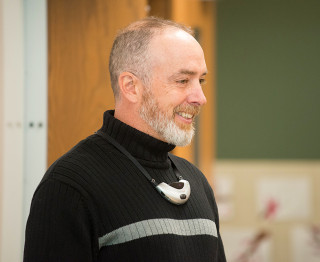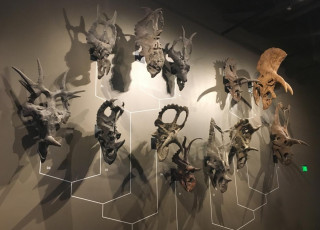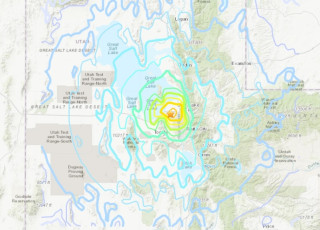Research Quest Inspires Students to Explore Utah's Wilderness
Students engaged with the new Research Quest investigations, photo ©NHMU
By Riley Black
"Is it ok I’m not wearing a white lab coat?” Museum scientist Mitch Power asked with a chuckle to the assembled 6th grade class at Glendale Middle School. “Yeah, not all scientists wear white lab coats,” he answered, and that was part of the point he was about to make to the students. Science is a way of understanding nature, not a uniform, and the aim of the Research Quest program Power was there to unveil helps make the point.
The latest Research Quest module, “Change in the Uinta Mountains: Normal or Not?”, is a research-based, interactive program that allows students to investigate broad scale environmental change right here in our own state. What’s killing the lodgepole pines and what that change means for the ecosystem the trees call home is the central focus of these online investigations. Each are designed to support students practice critical thinking with Power and host Isabel Perez-Vega as their guides.

Perez-Vega was especially enthusiastic about unveiling the new module to the students. She’s a graduate of Glendale Middle School and became involved with the Museum through the Youth Teaching Youth program when she was in seventh grade, now bringing the latest in education to the school she once attended. “I learned about science in Youth Teaching Youth,” Perez-Vega says, “how to be a thinker, and how to use evidence to support facts.” Now, through Research Quest, she’s passing on those same skills to a new generation of students. In fact, the Glendale Middle School students even helped shape the new Research Quest module by helping test the program.
This new group of investigations is about much more than what’s transpiring in the ecosystems outside Salt Lake City, though. Through Research Quest, students develop the skills to think critically about the world around them; to make informed, evidence-based decisions – and additional investigations are in design to further this goal. “I want you to go outside the classroom,” Power told the students, “Go outside, walk around in the forest, then apply some of these ideas there.” Once you know what to look for, whole new worlds open up.
Research Quest is free, easy-to-use, engaging for students, and supports many curriculum standards. Learn more about using it in your classroom here.
The Research Quest project is made possible with generous support from the Joseph and Evelyn Rosenblatt Charitable Fund and the IJ and Jeanné Wagner Foundation. Their ongoing support, combined with a generous grant from the Utah Department of Workforce Services’ Utah Cluster Acceleration Partnership program, funding from the Utah State Legislature’s Informal Science Education Enhancement program, and a grant from the National Science Foundation, has allowed Research Quest to become a valued teaching resource for teachers and students throughout Utah and in states nationwide.
Riley Black is the author of Skeleton Keys, My Beloved Brontosaurus, Prehistoric Predators, and a science writer for the Natural History Museum of Utah, a part of the University of Utah in Salt Lake City. Our mission is to illuminate the natural world and the place of humans within it. In addition to housing outstanding exhibits for the public, NHMU is a research museum. Learn more.



